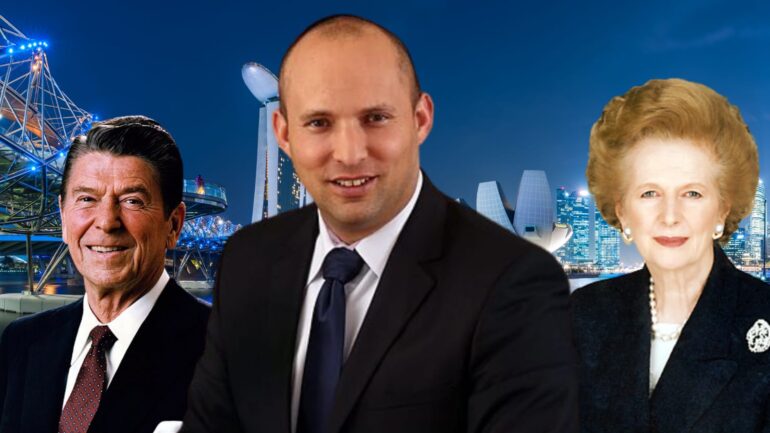Member of Knesset Naftali Bennett (Yamina) has a new “Singapore Plan” to turn the State of Israel’s economy into one as successful as that of, you guessed it, Singapore. He posted some short videos of himself this week talking about how massive tax cuts will turn our economy around. He even likened his plan to that of Ronald Reagan’s and Margaret Thatcher’s trickle-down economic programs.
It sounds great! In a few years, our country’s many economic problems will be solved and wealth will be created! The only problem is… trickle-down economics doesn’t work. At best, it causes no significant change. At worst (and most often), it widens the wealth gap.
Israel already suffers from growing inequality, which has only been exacerbated in the past year. The COVID-19 pandemic has left close to 20% of the country unemployed or on unpaid leave, and as much of the country was living paycheck to paycheck even before the crisis, many people have been able to survive only due to unemployment payments and national health insurance. Where, exactly, would the money for these necessary public funds come from, if not from the taxes that Bennett wants to drastically cut?
If Bennett’s plan were to ever actually be implemented, I would expect the following to happen. National insurance would become underfunded, which would negatively affect anyone who can’t afford private health care, who needs unemployment and/or disability benefits, who has a child and needs paid maternity leave, who gets injured while at work, etc., etc. (if it wasn’t clear, that’s just about everyone except the wealthy).
Already-underfunded and mismanaged ministries and organizations would suffer even more. The economy won’t grow at a particularly fast rate, because there’s no reason why Israel would be the exception to rule, proven by decades of data.
Israel’s wealthy minority would either invest their extra disposable income to create even more wealth for themselves, or they would spend it abroad (as Israelis tend to do when given the opportunity, because prices are generally lower elsewhere and no one wants to be a friar). Prices would increase, shutting out the lower-income families from anywhere but the periphery, and trapping them in a cycle of poverty.
Contrary to the rhetoric that’s often employed to promote such policies, small businesses would actually suffer from Bennett’s Singapore Plan because small business owners tend to rely on social benefits, which would be underfunded.
The tax cuts and survival-of-the-fittest decrease in regulations would primarily benefit large companies that would then be able to knock out or swallow up smaller competitors. Large corporations would become even larger, the wealthy would become even wealthier, and… do you see where I’m going with this?
If Naftali Bennett really wants to jumpstart the economy and not just help his friends/fellow high tech success stories, he would promote an economic plan that actually had a chance of meeting the needs of the Israeli public – especially the sectors most brutalized by the current crises.






Thank you for that! I wasn’t sure before about the value of Bennett’s plan, but whenever I see people citing the wealth gap as the main problem, I know that what they are attacking is probably a good idea. In every country where there is a healthy wealth gap, the actual standard of living of the poorest 10% is far better than in countries which irresponsibly burden the top 10% with heavy taxation in an attempt to artificially narrow the gap. There are numerous reasons for this phenomenon, but it’s a fact.
BTW, the “studies” on trickle-down economies (like the US, hello!) start with the bullseye of the wealth gap and draw circles around that. They never actually study the standard of living of the poor compared to non-trickle-down economies, which would be the most equitable way to judge economic stategies. Also, average and median standard of living needs to be examined and factored into an overall picture of economic efficacy.